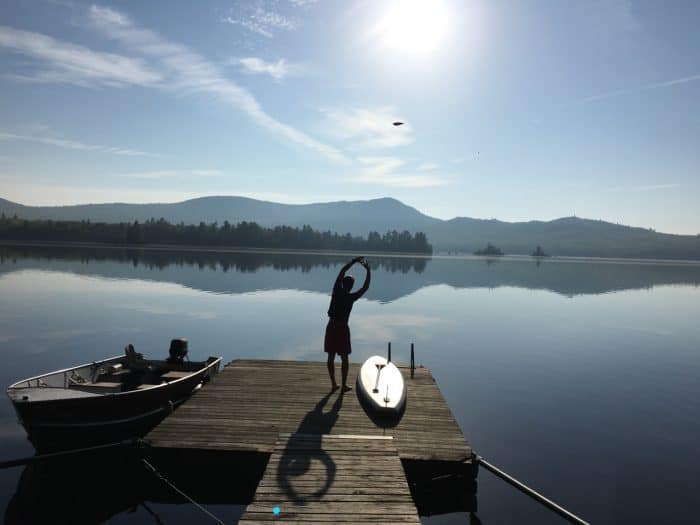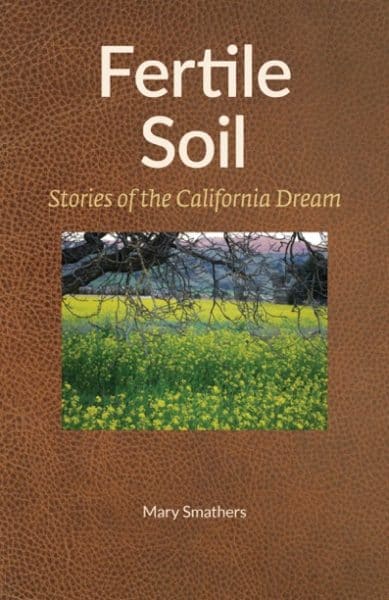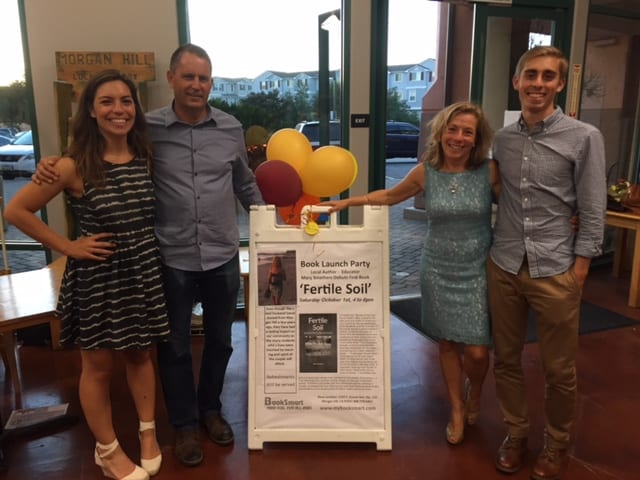Mary Smathers grew up and spent her entire life in the San Francisco Bay Area. On a trip to Costa Rica, however, she and her husband fell in love with Nosara Beach and kept coming back, eventually building and moving to a home in Ostional in 2012.
From her perch in Guanacaste, she has found the time and space she needed to write about her other home. Smathers just released her first book of fiction, Fertile Soil: Stories of the California Dream, short stories that reflect life in California and the struggles of people who live there.
Smathers says she loved writing since childhood, but put it on the back burner during her 30-year career in education and business. She now writes for the bilingual newspaper La Voz de Guanacaste and, in 2013, joined a weekly MeetUp called Shut Up and Write where she started to develop the characters and stories for Fertile Soil.
Smathers also loves photography. Her website features a gallery full of highlights of Costa Rica and the places she has traveled.
The Tico Times talked to the author about her new book and Costa Rica’s role in her writing career. Excerpts follow.
When and why did you start writing?
I started creative writing when I was a child. I used to write poems and little stories, and I always read a lot of fiction. In eighth grade, I just stopped; all our school writing was analytical essays and never anything else… I wrote for my college newspaper, The Daily Cal, and also for The Stanford Daily when I was a grad student at Stanford. I love journalism.
While I was in education, I always did technical writing wherever it came up. When there were manuals to write or reports to edit, I always volunteered, and I started writing grants when I became an administrator… I always wanted to write fiction. I have a novel I have always wanted to write and have played around with a tiny bit off and on. I’ve done some research and written a bit; I have maybe 35 pages. But I never had time to write creatively. I was busy raising my kids, doing my job, maintaining my household and family. I never felt I could take time for myself just to write.

Why did you move to Costa Rica, and what’s like to write from here?
I first came to Costa Rica in 2005. We traveled around the northern part of Guanacaste for two weeks. When my husband and I got to Nosara, we just fell in love. The kids asked, “OK, where are we going next?” And we looked at each other and said, “We’re staying here another day.” And then another day, and another!
We started coming to Nosara for all our family vacation time. We rented houses and condos and started meeting people and getting to know the area and making friends. Both my husband and I had grown up in the San Francisco Bay Area and lived our entire lives there; we never left for college or jobs or anything. Once both our kids left home for college, I think we were ready for a new kind of adventure. We built our house in Ostional in 2011 and moved here after our son left home for college four years ago.
Costa Rica has inspired my writing by allowing me to be in a whole new environment. The quiet lifestyle of the beach in Guanacaste is great for writing. There is a lot of noise and craziness in California that can be distracting. I can write there, too, but I think I am a more productive writer at my home in Costa Rica. The most important thing for me is a smallish, quiet study where I can go deep into my private zone to produce. I have written while on the road in coffee shops in San Francisco or Paris, but I really prefer a quiet little office to work in.
Tell me about Fertile Soil.
Living my whole life in California, I deeply love the place and the wide variety of people who live there, and empathize with the difficulties many face… As a teacher, administrator and then education businesswoman [in the education sector], I worked with thousands and thousands of students and their parents. I observed and heard so many crazy, sad and uplifting stories.
[California] isn’t all sparkly and gold. The dream is not always realized. There is poverty and income inequality, terrible homelessness, poor treatment of immigrants, segregated communities, discrimination, people struggling to keep up with the expensive cost of living there, the boom and bust economies which have persisted in the state for hundreds of years. I find that complexity fascinating, and rich with material to write about. So I am interested in working people, just regular people, who deal with all kinds of issues and in many cases, are resilient, persistently don’t give up, keep working hard and are doing the best they can against forces way bigger than themselves.
Another theme I am really interested in is why the Silicon Valley area is such a hotbed of innovation. What has shaped that place’s culture? What influences have made it, and continue to make it, one of the most uniquely productive and innovative regions of the world right now?

What are common traps for aspiring writers?
I have been an aspiring writer my whole life. For me to actually move to a new phase where I have produced a book and actually call myself a writer is super new and just huge. It is very exciting, and there were many times I didn’t think I would get here.
The first trap is to just think about it, dream about it, read about it, and never write. I was like that for years and years. Number one, if you want to be a writer, is to write. All the writers-on-writing books I have read pretty much say that, too. They also have lots of other good tips and tricks, but you have to actually put your butt in the chair and write.
Another huge trap for many is getting caught up in the self-doubt and fear of failure that can consume many of us. “I can’t write. I’m not good enough, smart or creative or clever enough.” One of my all-time favorite books by a writer about writing is “Bird by Bird” by Anne Lamott. I highly recommend it for any aspiring writer. Anne has a whole chapter on what she calls “shitty first drafts.” Everyone writes them, including her and all other professional writers. You have to accept that you are going to write some crap but then keep on writing and use those drafts to think through what you really want to say.

What does a writer need in order to write?
For fiction, I think you need to be inspired. I am so motivated by people I know who do great things, or people I met or heard about who dealt with incredible hardship and persevered. You have to feel strongly about something in order to tell a story.
Sometimes when I read my own stories out loud as an editing technique, I cry. When I read the story of Connie, who struggles with constant money problems and is then recognized by her entire school community for the dignity and competence with which she has done her job for over 30 years, I cry. I love my characters deeply. I admire them and their struggles. I applaud their achievements, no matter how little. So my work comes from a place of strong emotion. You have to really care. You have to find beauty in the smallest things and be determined to represent that to your audience. I hope others admire Connie and think about what people like her endure, and maybe have greater compassion toward a Connie in their life in the future. …In the next few months, I am planning to read my stories out loud to create an Audible Book, so I will have to work hard not to cry at that point in Connie’s story.
But in fiction writing, don’t forget: it is fiction. You get to make things up! You get to be creative and imagine all kinds of people or places or events that might not have actually occurred that way. This is the great luxury in fiction, and maybe biggest challenge at the same time. But it has to ring true to the heart. If your reader doesn’t buy it, then you are sunk. A writer must be authentic above all.
Our “Weekend Arts Spotlight” presents Sunday interviews with artists who are from, working in, or inspired by Costa Rica, ranging from writers and actors to dancers and musicians. Do you know of an artist we should consider, whether a long-time favorite or an up-and-comer? Email us at kstanley@ticotimes.net.






